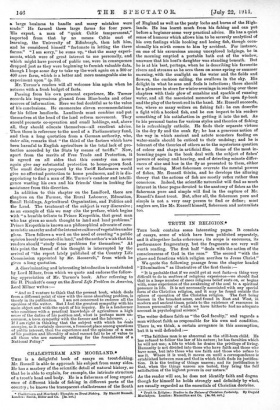TRUTH IN RELIGION.*
THIS book contains some interesting pages. It consists of essays, some of which have been published separately, and it altogether lacks coherence ; its scope is enormous, its performance fragmentary, but the fragments are very well worth reading. The first half "deals with the action of the consciousness of God in the race." The second "with the place and functions which religion ascribes to Jesus Christ."
We quote the following passage from the chapter headed "Illumination" as illustrative of the first thesis :—
"It is probable that if we could get at root facts—a thing very difficult to do in matters of religious experience—we should find that in a large number of cases religious belief rests on, or begins with, some experience of the awakening of the soul to a spiritual presence in life. It is not necessarily associated with any special form of the Christian religion, and it may be found outside the sphere of operation of the Christian religion. The fact being human in the broadest sense, and found in East and West, in modern and ancient times, points to the existence of resources in human personality of which we have hitherto had no adequate account in psychological science."
The writer defines faith as "the God faculty," and regards a man without faith as responsible for his own sad condition. There is, we think, a certain arrogance in this assumption, but it is well defended :— "The faithless man is as abnormal as the still-born child. Ile has refused to follow the law of his nature ; he has faculties which he will not uso ; a life to which he denies the privilege of living. Humanity is not divided into those who have faith and those who have none, but into those who use faith and those who refuse to use it. Where it is used, it moves on until a correspondence is established between man and God in which faith finds its justifica- tion. It is the testing of things unseen ; and its justification is that, when the things unseen are tested, they bring the full satisfaction of the highest powers in our nature."
As the reader will see, he does not identify faith and dogma though for himself he bolds strongly and definitely by what, are usually regarded as the essentials of Christian doctrine.
• Truth in Religion : Studies in the Nature of Christian Certainty. By Dusaid Maefaayen. London: Macmillan and Co. [48. 6d. net.]






































 Previous page
Previous page